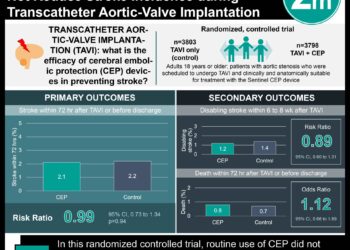Acoramidis slows disease progression in transthyretin amyloid cardiomyopathy
1. In this randomized controlled trial, patients with transthyretin (TTR) amyloid cardiomyopathy exposed to acoramidis had slower disease progression than those on a placebo.
2. There were significantly fewer adverse events in the acoramidis group, along with a higher quality of life.
Evidence Rating Level: 1 (Excellent)
Study Rundown: TTR is a transport protein with many variant types that, when destabilized, causes TTR amyloid cardiomyopathy. Each TTR variant type has differing destabilization rates, thus differing their disease onset and pathogenesis. Since the destabilization of TTR tetramers has shown adverse effects on individuals with the proposed disease, it was of utmost importance to the researchers to determine the best treatment option. Destabilization with different molecules has been suggested and tested as a treatment option, and the study specifically examined the stabilizing effects of acoramidis, also known as AG10, on TTR. Using a double-blind, randomized trial, the participants were assigned to either the placebo or exposure groups, receiving active acoramidis. The study detailed the importance of acoramidis as an effective treatment for those suffering from TTR amyloid cardiomyopathy compared to other TTR stabilizers. As a limitation, the mortality results in the study may have been affected due to outside factors such as better diagnostic tools and increased awareness. The study results suggest that acoramidis had increased binding affinity and TTR stabilization than other stabilizers. Overall, there were more adverse effects found in participants of the placebo group when compared to the group receiving acoramidis.
Click to read the study in NEJM
In-Depth [randomized controlled trial]: This was a randomized controlled trial assessing the impact of acoramidis on TTR cardiomyopathy disease progression. Individuals who were eligible to participate in the study had to be between the ages of 18-90 years, have a diagnosis of TTR amyloid cardiomyopathy, and have clinical heart failure with at least one hospitalization. The study excluded any individuals with a diagnosis of acute coronary syndrome, coronary revascularization, stroke, or ischemic attack within 90 days before screening took place. The randomization of 632 patients who met the criteria occurred between April 2019 and October 2020. Of these individuals, 90.3% had the wild-type TTR. When determining which group had better outcomes, according to the primary analysis, there were more beneficial outcomes seen in the acoramidis group than the placebo, with a win ratio of 1.8 (95% Confidence Interval [CI], 1.4 to 2.2). One important measure that those in the acoramidis group reported was a higher quality of life. In both groups, the overall incidence of adverse events occurring was similar (98.1% for the acoramidis and 97.6% for the placebo). However, in terms of serious adverse events occurring, the acoramidis group showed less of these (54.6% vs 64.9% for the placebo group). The frequency of hospitalizations due to cardiovascular-related events favored acoramidis, with a relative risk ratio of 0.496 (95% CI, 0.355 to 0.695). In summary, this study shows that acoramidis is an effective destabilizing agent targeting TTR. Thus, it may be a good treatment option for TTR amyloid cardiomyopathy.
Image: PD
©2024 2 Minute Medicine, Inc. All rights reserved. No works may be reproduced without expressed written consent from 2 Minute Medicine, Inc. Inquire about licensing here. No article should be construed as medical advice and is not intended as such by the authors or by 2 Minute Medicine, Inc.







